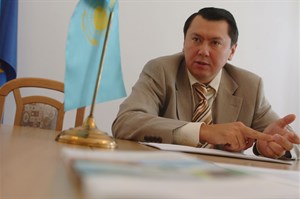 Rakhat Aliyev enjoyed the benefits of Panama too. Large profits from the sugar businesses that he once launched in Kazakhstan were allegedly transferred to offshore accounts.
Rakhat Aliyev enjoyed the benefits of Panama too. Large profits from the sugar businesses that he once launched in Kazakhstan were allegedly transferred to offshore accounts.
According to one of his advisers, Aliyev never concealed the fact to Vienna – the intriguing documents from Panama are reviving speculations on the case of the former Kazakh Ambassador to Vienna, Rakhat Aliye.
The ex-son-in-law of Kazakh President Nursultan Nazarbayev was imprisoned on remand in Vienna on (among other charges) suspicion of murder; in February 2015, he committed suicide before the start of the trial.
The Panama Papers, to which the ORF and Falter refer in their reports, reveal that in 2003 Aliyev arranged for his companies A. V. Maximus S. A. and Agrocom Ltd. to be organised on the Virgin Islands through the services of the Panamanian letterbox specialists Mossack Fonseca (which provided the data). There was and is an A. V. Maximus Holding AG in Vienna too, which is meanwhile owned by Aliyev’s widow.
Delayed reaction of the banks.
However, to return to the financial transactions and flow of money surrounding Aliyev: the Austrian banks, who for years conducted transactions for the diplomat and his letterbox company, failed to become suspicious until 2007. At that time, Aliyev fell into disfavour at home; Austrian media began to report on the accusations from Kazakhstan (such as people smuggling, the formation of a criminal ring, tax evasion and money laundering). And that was when Austria’s banks first reported suspected money laundering. As a consequence, Aliyev took his money to Malta – where he himself later followed.
Previously, he had brought media corporations and the Nurbank under his control in Kazakhstan – and had made millions through, above all, the sugar and sugar mill businesses. According to Kazakh authorities (Aliyev and the Kazakhs have been fighting each other at every judicial level, employing practically any means), between 2005 and 2007, about 25 million EUR from the sugar business were transferred to the offshore company A. V. Maximus; in all, 300 million dollars from these sweet transactions allegedly landed offshore.
Adviser,"Never kept secret".
During his lifetime, Aliyev himself had a very different way of explaining it all. He countered the accusation of tax evasion in Kazakhstan by requesting that the fiscal authorities there should prosecute the companies concerned. However, from 2007 onwards, after his divorce from Nazarbayev’s daughter, they no longer belonged to him. And in the sugar business, he was the first to import not the expensive already refined sugar to Kazakhstan, but cheaper raw sugar, which was then refined in Kazakhstan. This had been his lucrative door into the business world.
According to an adviser, Aliyev "never disputed or concealed the asset structure in Liechtenstein, Panama and Malta". He chose it in order to protect his fortune from Nazarbayev. At all events, when the Anti-Money Laundering Procedure was introduced in June 2007, Aliyev’s Austrian accounts (allegedly containing around 80 million EUR) were frozen – but only until July. The Regional Court of Vienna justified its decision to unblock the accounts by stating that "no further documents relating to any criminal offences either inside or outside the Republic of Kazakhstan had been presented" by Kazakhstan (which had issued an arrest warrant against Aliyev).
It also stated that there was insufficient suspicion of money laundering to justify blocking his accounts. The judge declared that "numerous notifications of suspected money laundering" submitted by the banks had "arisen solely due to the media reports". Let us not forget: in June 2008, Bank Austria had reported a second case of suspected money laundering: as reported, a million dollars had been found in an abandoned safe belonging to Aliyev. He had simply forgotten it there.
Brandstetter was one of Aliyev’s advisers
Until 2011, Wolfgang Brandstetter, the present Minister of Justice, was Aliyev’s legal adviser. In 2014, he was, as already reported, employed as a kind of advisory board member of the Liechtenstein Innings Establishment, which ex-ambassador Aliyev had founded in 2008. The Liechtenstein Ministry of Justice had investigated the company due to non-transparent cash flows. In 2014, Brandstetter emphasised in an interview with the STANDARD that he had never held any operational function there. (Renate Graber, 6.4.2016)
«Der Standard», April 6, 2016 г




